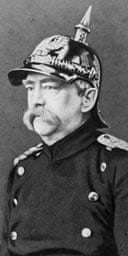
The dominant position of France in Europe was purely a result of the complete disunity of the rest of Europe itself. This disunity also deeply suppressed the entire European economy and everyone understood this because England in particular and France showed everyone the value of an united home market.
Bismarck ended that and created a larger Euro-market even if it was the empire of Germany that then essentially caught up to Britain and had long surpassed France by 1914. This was the certain genesis of WWI.
There were two great stupidities driving France and England. The first was the total failure of France to get over its military reduction in status in 1871 and to aggressively work with Bismarck to produce a common trading bloc that benefited both. This would have naturally lessened mutual fears. This ultimately was the solution in 1945.
The second stupidity was Britain's decision to engage proactively as an ally with France in support of a future continental war in which England had zero possibility of future benefit. I suspect that the true champion here was none less than Churchill who certainly energized the whole Meme.
Bismarck' genius in time and place broke open the first advent of modernity in commerce and even governance. We have been accelerating time ever since. So his loss impacted the future of modernity itself and still left a French dictatorship in place for generations. This would not have been glorious for France as the British empire continued to dominate globally leaving France as an imperial backwater.
..
How France missed a chance to sink Bismarck
Luke Harding in Berlin
Tue 22 Aug 2006 12.09 BST
German chancellor Otto von Bismarck. Photograph: Getty
https://www.theguardian.com/world/2006/aug/22/germany.lukeharding
He was the man who famously unified Germany and ended France's domination of Europe. But new documents found in a dusty town hall reveal that the German chancellor Otto von Bismarck nearly drowned while swimming at the French seaside resort of Biarritz, an event that could have profoundly changed the course of European history. Records found in the archive of the local swimming committee show that a quick-thinking French lifeguard, Pierre Lafleur, plucked a floundering Bismarck from the waves. Lafleur also rescued Bismarck's mistress - 21-year-old Katharina Orloff - who had also got into difficulties during the trip in August 1862.
"The weather was good and the ocean was calm. But somehow Bismarck got swept out to sea by a strong current," Monique Beaufils, archivist at Biarritz's town hall, told the Guardian yesterday.
"Lafleur rescued the unconscious princess first. He then went back for Bismarck who was waving his arms for help. This wasn't easy. Bismarck was a big man, 1.9 metres [6ft 2in] tall, and weighed 100kg [220lb]. By the time Lafleur got him back to the beach he had passed out. A doctor revived him a few minutes later."
The rescue of Bismarck - then Prussia's ambitious ambassador in Paris, in his mid-40s - would prove costly for France. Eight years later, in 1870, he masterminded Prussia's swift, crushing defeat of France in the Franco-Prussian war, ending French primacy in Europe. The Iron Chancellor went on to unify Germany, something that had eluded its kings and rulers since Charlemagne.
French patriots yesterday said it might have been better if Lafleur had let Germany's future chancellor sink. "If only they'd let the chap drown then France would have been spared a lot of suffering," mused the Berliner Zeitung newspaper, which reported the discovery.
The story, meanwhile, didn't end happily for Lafleur, a lighthouse keeper. He drowned in the Atlantic four weeks later. Bismarck agreed to be godfather to Lafleur's baby son, while his mistress - the wife of an elderly Prussian war hero, Prince Orloff, who apparently tolerated the affair - became godmother.
Bismarck recalled his time in Biarritz, where he met the French emperor Napoleon III, as the happiest of his life. "I have lost the illusion, that we can be happy again in Biarritz," he wrote later to his ailing mistress, who died in 1875 at 35.
The rescue of Bismarck - then Prussia's ambitious ambassador in Paris, in his mid-40s - would prove costly for France. Eight years later, in 1870, he masterminded Prussia's swift, crushing defeat of France in the Franco-Prussian war, ending French primacy in Europe. The Iron Chancellor went on to unify Germany, something that had eluded its kings and rulers since Charlemagne.
French patriots yesterday said it might have been better if Lafleur had let Germany's future chancellor sink. "If only they'd let the chap drown then France would have been spared a lot of suffering," mused the Berliner Zeitung newspaper, which reported the discovery.
The story, meanwhile, didn't end happily for Lafleur, a lighthouse keeper. He drowned in the Atlantic four weeks later. Bismarck agreed to be godfather to Lafleur's baby son, while his mistress - the wife of an elderly Prussian war hero, Prince Orloff, who apparently tolerated the affair - became godmother.
Bismarck recalled his time in Biarritz, where he met the French emperor Napoleon III, as the happiest of his life. "I have lost the illusion, that we can be happy again in Biarritz," he wrote later to his ailing mistress, who died in 1875 at 35.
No comments:
Post a Comment